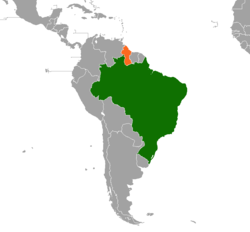Brazil–Guyana relations
This article needs additional citations for verification. (June 2009) |
 | |
Brazil |
Guyana |
|---|---|
Brazil–Guyana relations have traditionally been close. Brazil has provided military assistance to Guyana in the form of warfare training and logistics. Bilateral relations between the countries have recently increased, as a result of Brazil's new South-South foreign policy aimed to strengthen South American integration.
During a state visit by Brazilian President Luiz Inacio Lula da Silva to Georgetown on 2 March 2007, the governments of Guyana and Brazil signed several cooperation agreements and announced plans to boost trade between the two countries.
History

After Guyanese independence in 1966 there was intense diplomatic activity with Brazil. In the case of Guyana's border with Venezuela, Brazil maintained a consistent policy in favour of the sanctity of established international borders through arbitration agreements and opposed any change of borders in the South American continent. In 1968, immediately after Venezuelan President Raul Leoni decreed "ownership" of a nine-mile strip of ocean off Guyana's three-mile territorial sea limits, the Brazilian government showed support to Guyana in the controversy with Venezuela. It also helped promote closer bilateral relations, and on August 26, 1968 Deputy Prime Minister Ptolemy Reid visited Brazil for discussions with leaders of the Brazilian government. As a result, the Brazilian government announced the opening of a Brazilian embassy in Georgetown.
In 1970, the Brazilian government inaugurated the Centre of Brazilian Studies in Georgetown and begun to construct a highway that would link the Brazilian city of Manaus to the capital of Guyana, Georgetown.
In 1975, the United States alleged that Guyana was allowing Cuban troops to refuel in Guyana en route to the Angolan civil war. The Brazilian military government was staunchly anti-communist, and it briefly undertook military maneuvers on its border with Guyana.
In November 2002, it was reported that Brazil had carried out a military operation in the region of Guyana claimed by Suriname, to destroy several airstrips used by drug traffickers. The Brazilian government did not confirm the story, but insisted that if it had been carried out it would have been done with Guyana's permission.
In 2016, during the commemorations of the 50th anniversary of Guyana's independence, the Brazilian government officially changed the way it spelled the name of its neighbouring country, from colonial-form Guiana, with an "i", to the post-independence, official form "Guyana".[1]
See also
References
- ^ "República Cooperativa da Guyana". www.itamaraty.gov.br. Retrieved 2016-07-04.
- "Aspects of Guyana's Foreign Policy". Guyana News and Information.
- "Guyana: Relations with Brazil". U.S. Library of Congress.
External links
- Brazilian Defence, Naval and Army Attaché in Guyana
- Ministry of Foreign Relations of Brazil
- Ministry of Foreign Affairs of Guyana

